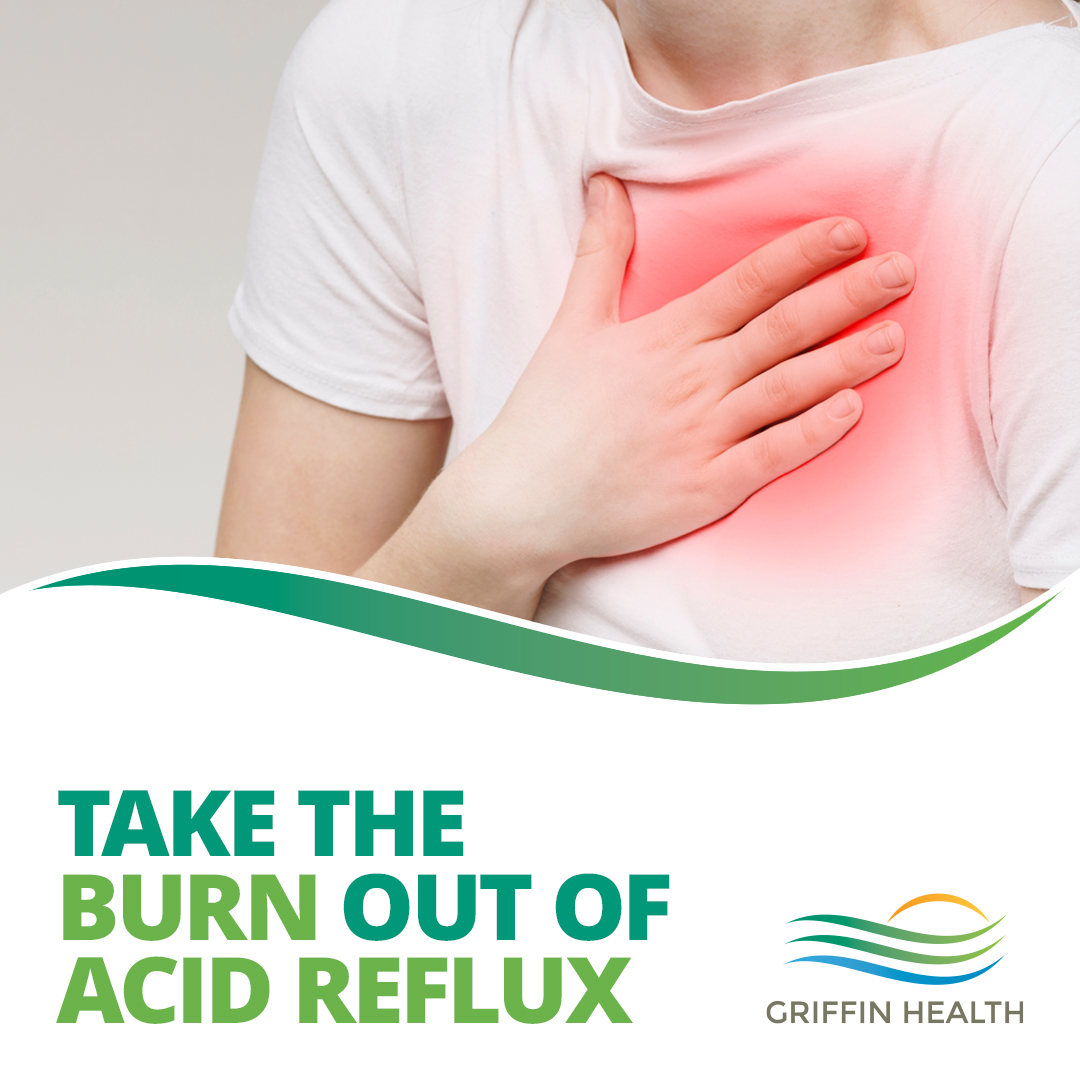
By Michael Lipcan, MD, Chief of Gastroenterology, and Griffin Health Communications & Public Affairs Intern Celina Daigle
Acid reflux is a common condition that affects millions of people, often causing discomfort and disrupting daily life.
Also known as “heartburn,” this health condition may be normal after a heavy meal, but can become chronic for some and cause complications. Understanding the causes, symptoms, and treatments for acid reflux can help you manage the condition and improve your quality of life. Here’s what you need to know about it and how to treat it effectively.
What is Acid Reflux?
Acid reflux typically occurs after eating. The circular muscle (called a sphincter) at the opening of the stomach doesn’t close as tightly as it should, allowing stomach acid and contents to rise and irritate the lining of the esophagus.
Acid Reflux Symptoms
Acid reflux creates an uncomfortable burning sensation or pain in the upper abdomen and chest. This is why the condition is known as heartburn. Some may also experience a sour or bitter taste in their throat and mouth, the feeling of a lump in the throat, bloating, and burping. Many people suffer from acid reflux, with some experience it chronically.
Gastroesophageal Reflux Disease (GERD)
If acid reflux is a chronic problem for you, it’s possible that you have GERD. This disease typically causes more intense symptoms than typical acid reflux, including trouble swallowing, chest pain, wheezing, stomach ulcers, and a long-term cough or coughing at night.
Risk Factors for Acid Reflux and GERD
Being overweight, smoking, and consuming alcohol, coffee, and spicy foods heavily can increase the risk of developing acid reflux. Taking NSAIDs like ibuprofen, Advil, and Aleve frequently also contributes to the risk. Other factors, such as being pregnant, eating and then lying down, and having a disease that affects connective tissues can further heighten the chances of developing chronic acid reflux or GERD. Additionally, the presence of H. pylori bacteria in your stomach or a hiatal hernia, a condition where part of the stomach is pushed through the diaphragm and into the chest, can increase the risk as well.
How to Help Prevent Acid Reflux
Overeating, bending over or lying down soon after consuming food or drink, eating highly acidic or spicy foods, and consuming alcohol can cause acid reflux. To combat the symptoms, it is recommended that you:
- Avoid certain foods
- Eat at least two to three hours before lying down
- Raise your upper body by about six to nine inches when sleeping
- Lay on your left side when sleeping
- Lose weight
- Quit smoking
- Eat high protein, low fat meals
- Swap tight clothing and belts around the abdomen with looser clothes
Over-the-counter medications such as antacids can help to neutralize stomach acid and can be taken once symptoms start. Examples include Tums, Maalox, Mylanta, and Riopan. However, they may not always help.
When to See Your Doctor or Gastroenterologist
There are many treatment options available for acid reflux, so it’s important to visit a doctor to determine which treatment plan works best for you as at-home remedies may not help. A gastroenterologist can provide relief from digestive tract issues quickly. An endoscopy may be performed to determine if you have ulcers in the lining of your stomach or esophagus or a hiatal hernia.
Your doctor may test you for H. Pylori and prescribe the appropriate antibiotics to treat the bacterial infection and prevent any ulcers. You may also be prescribed an H2 blocker like Famotidine, Tagamet, or Zantac to reduce stomach acid production and provide symptom relief within the hour.
Proton Pump Inhibitors (PPIs) such as Omeprazole, Pantoprazole, and Esomeprazole are another form of medication to treat acid reflux, GERD, and stomach ulcers. PPIs reduce acid levels in the stomach and provide more long term relief than antacids or H2 blockers. They may take one to seven days to take effect.
Griffin’s Acid Reflux Experts
Griffin Faculty Physicians Gastroenterology Specialists are dedicated to helping you and your gut stay healthy and happy. Call 203-736-9919 to book your appointment today with one of our talented caregivers for any concerns or disorders related to your upper and lower digestive tract. Visit https://gfp.griffinhealth.org/specialty-care/gastroenterology for more information.